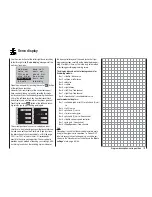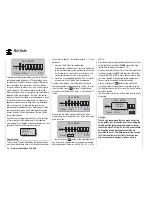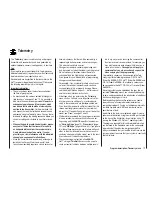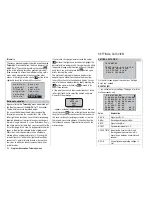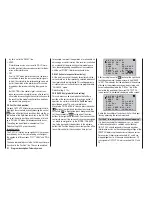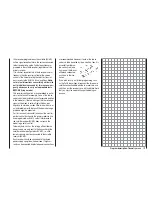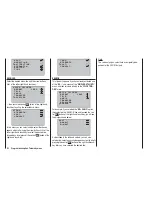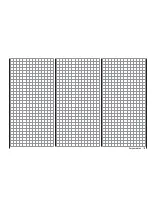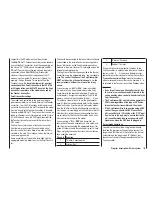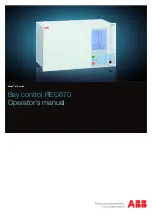
121
Program description: Telemetry menu
where or other without causing major damage. However,
if the interference strikes in the wrong place and at the
wrong time, then a power model could become uncon-
trollable and tear wildly across the fl ying fi eld, endanger-
ing pilots and spectators.
For this reason you really must consider whether you
should at least program the throttle to “motor stopped”,
to avoid the worst of these risks.
After that warning we present a brief description of the
three possible Fail-Safe variants offered by the
mx-16
HoTT transmitter:
The simplest way of setting Fail-Safe - and the one we
recommend - is to use the “
Fail-Safe
” menu, which is
accessed from the multi-function list; see page 116.
A similar alternative, albeit slightly more diffi cult to ac-
cess, is to use the “FAIL-SAFE ALL” option described on
the next double-page.
And fi nally there is the relatively complex method of
entering individual settings using the “MODE”, “F.S.Pos.”
and “DELAY” options. The description of this variant
starts below with the “MODE” option.
Value
Explanation
Possible settings
OUTPUT CH Output channel
(receiver servo
socket)
1 … according to
receiver
INPUT CH
Input channel
(control channel
coming from
transmitter)
1 … 16
MODE
Fail-Safe mode
HOLD
FAIL SAFE
OFF
F.S.Pos.
Fail-Safe position
1000 … 2000 µs
DELAY
Response time
(delay)
0,25, 0,50, 0,75
and 1,00 s
FAIL SAFE
ALL
Stores fail-safe
positions for all
control channels
NO / SAVE
POSITION
Displays stored
Fail-Safe position
between approx.
1000 and 2000 µs
OUTPUT CH (servo socket)
In this line you select the OUTPUT CH (receiver servo
socket) which is to be adjusted.
INPUT CH (input channel select)
As already mentioned on page 117, the eight control
functions of the
mx-16
HoTT transmitter can be
shared out between several receivers if necessary, or
alternatively several receiver outputs can be assigned
to the same control function; for example, you may wish
to be able to operate each aileron with two servos, or to
control an oversized rudder using two coupled servos
instead of a single one.
Sharing control functions amongst multiple HoTT receiv-
ers is a useful idea for large-scale models, for example,
to avoid long servo leads. In this case bear in mind that
only the last bound receiver can be addressed using the
“
Telemetry
” menu.
The eight control channels (INPUT CH) of the
mx-16
HoTT can be managed in the appropriate manner using
the facility known as “channel mapping”, i. e. by assign-
ing a different control channel in the INPUT CH line to
the receiver servo socket selected in the OUTPUT CH
line. BUT CAUTION: if, for example, you have entered
“2AIL” in the “Aileron/fl ap” line of the “
Basic settings
”
menu at the transmitter, then control function 2 (aileron)
is already divided to control channels 2 + 5 for the left
and right ailerons. The corresponding receiver INPUT
CH, i. e. those to be mapped, would in this case be
channels 02 + 05.
Examples:
You wish to assign two or more servos to each ailer-
•
on of a large-scale model aircraft:
Assign one and the same INPUT CH (control chan-
nel) to each of the appropriate OUTPUT CH (servo
sockets). The appropriate servo sockets are selected
for the left or right wing, while the INPUT CH will be
one of the two default aileron control channels 2 + 5.
You wish to control the rudder of a large-scale model
•
aircraft using two or more servos:
Assign one and the same INPUT CH (control chan-
nel) to each of the appropriate OUTPUT CH (servo
sockets); in this case the default rudder channel 4.
MODE
The settings you enter for the options “MODE”, “F.S.Pos.”
and “DELAY” determine the receiver’s behaviour if inter-
ference should affect the transmission from transmitter
to receiver.
The setting programmed under “MODE”
always
refers to
the channel you have set in the OUTPUT CH line.
The default setting for all servos is “HOLD”.
For each selected OUTPUT CH (receiver servo socket)
you can choose between:
FAI(L) SAFE
•
If interference occurs, the corresponding servo
moves to the position displayed in the “POSITION”
line for the duration of the interference, after the “de-
Summary of Contents for mx-16 HOTT
Page 7: ...7 For your notes...
Page 37: ...37 For your notes...
Page 41: ...41 For your notes...
Page 45: ...45 For your notes...
Page 51: ...51 For your notes...
Page 55: ...55 For your notes...
Page 81: ...81 For your notes...
Page 103: ...103 For your notes...
Page 133: ...133 For your notes...
Page 141: ...141 For your notes...
Page 161: ...161 For your notes...
Page 173: ...173 For your notes...







